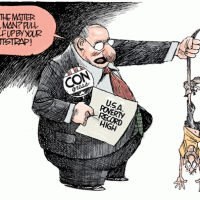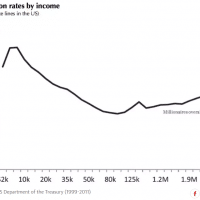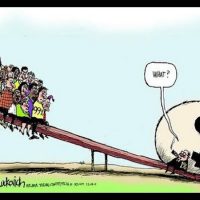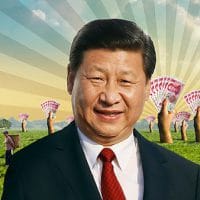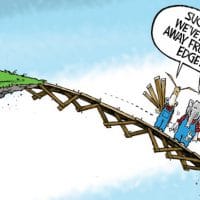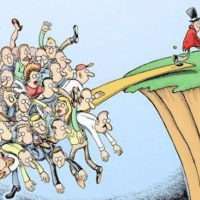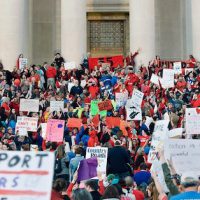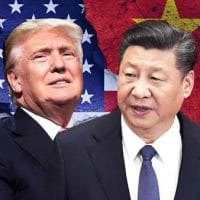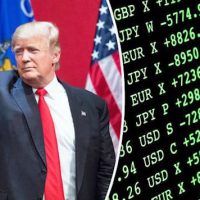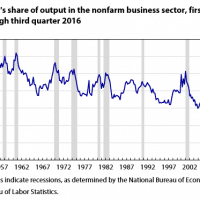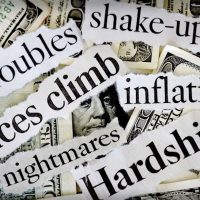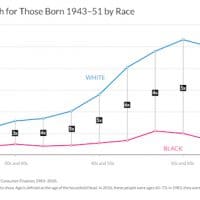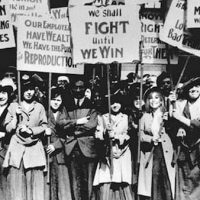-
Magical bootstraps and the struggles of working Americans
A recession is coming, sooner or later. Once it hits, we can expect articles bemoaning the fact that working people didn’t build-up their savings during this record expansion to help them through the hard times. If only they had pinched pennies here and there, skipped a new TV or smart phone, they could have generated some capital that could have been invested…. Ah the missed opportunities.
-
U.S. militarism marches on
Republicans and Democrats like to claim that they are on opposite sides of important issues. Of course, depending on which way the wind blows, they sometimes change sides, like over support for free trade and federal deficits. Tragically, however, there is no division when it comes to militarism.
-
U.S. manufacturing is far from healthy and the main reason appears to be globalization
Public awareness and acceptance of the negative consequences of corporate-driven globalization on U.S. workers has grown dramatically over the last years, aided in part by Donald Trump’s attacks on trade agreements like NAFTA.
-
Ignore their threats, tax the rich
In most states in the United States, the rich have enjoyed ever lower rates of taxation while working people have suffered from inadequately funded public services.
-
The U.S. is a world leader in income and wealth inequality
A recent article published in the American Economic Review, “Global Inequality Dynamics: New Findings from WID.world,” draws upon the World Wealth and Income Database to examine trends in global inequality.
-
The Chinese economy: problems and prospects
The Chinese economy is big. In 2017, it was the world’s biggest based on purchasing power parity. Its output equaled $23.12 trillion, compared with $19.9 trillion for the EU and $19.3 trillion for the U.S.
-
Living on the edge: Americans in a time of “prosperity”
These are supposed to be the good times—with our current economic expansion poised to set a record as the longest in U.S. history.
-
Corporate taxes and false promises: U.S. workers and the 2017 tax cuts and jobs act
In December 2017 the Congress approved and the President signed into law the Tax Cuts and Jobs Act.
-
What next for the teacher’s movement?
Public school teachers in West Virginia, Oklahoma, Kentucky, and Arizona have won meaningful salary gains for themselves, and in several cases other school workers, and real although limited increases in education spending.
-
Public school teacher strikes show workplace organizing pays off
While those at the top of the income pyramid continue to celebrate economic trends, the great majority of working people continue to struggle to make ends meet
-
What’s driving trade tensions between the U.S. and China
There is a lot of concern over the possibility of a trade war between China and the US. In early April President Trump announced that his administration was considering levying $100 billion of additional tariffs on Chinese exports, after the Chinese government responded to a previously proposed U.S. tariff hike on Chinese goods of $50 billion by announcing its own equivalent tariff hikes on U.S. exports. And the Chinese government has made clear it will again respond in kind if these new tariffs are actually imposed.
-
U.S. trade deficits, Trump trade policies, and capitalist globalization
Understandably concerned about the consequences of the large and sustained U.S. trade deficit, many workers have grown tired of waiting for so-called market forces to produce balance. Thus, they cheer Trump administration promises to correct the imbalance through tariffs or reworked trade agreements that will supposedly end unfair foreign trade practices.
-
U.S. workers and their decades of lost earnings
It happened gradually, but thanks to the U.S. media, economic news has largely been reduced to stock market reporting. Want to know how the economy is doing? Check the S&P 500 Index. Want to know whether the latest Trump proposal is good or bad? Check the S&P 500 Index.
-
Globalization and U.S. labor’s falling share of national output
The decline in the payroll share of output is class power at work: unfortunately theirs, not ours.
-
North Korea in the age of Trump
On January 23, Hyun Lee, the managing editor of ZoominKorea, and I spoke at a UCLA Center for Korean Studies sponsored event titled “North Korea in the Age of Trump.” I went first, offering a critical perspective on U.S. foreign policy towards Korea, North and South. Hyun Lee then talked about the importance of Science […]
-
Signs of economic trouble ahead
The current expansion has gone on for 102 months. Only the expansions from March 1991 to March 2001 (120 months) and from February 1961 to December 1969 (106 months) are longer. Unfortunately, growth during this expansion has been slow and the gains have largely gone to a very few. And there are signs of economic trouble ahead.
-
Too many whites are in denial about the extent of race-based economic inequality
A recently published paper by three Yale scholars reveals “that Americans, on average, systematically overestimate the extent to which society has progressed toward racial economic equality, driven largely by overestimates of current racial equality.”
-
Class, race, and U.S. wealth inequality
People tend to have a distorted picture of U.S. capitalism’s operation, believing that the great majority of Americans are doing well, benefiting from the system’s long-term growth and profit generation. Unfortunately, this is not true. Median wealth has been declining, leaving growing numbers of working people increasingly vulnerable to the ups and downs of economic […]
-
Taxes, inequality, and class power
No doubt about it, the recently passed tax bill is terrible for working people. But as Lance Taylor states in a blog post titled “Why Stopping Tax ‘Reform’ Won’t Stop Inequality”: “Inequality isn’t driven by taxes—its driven by the power of capital in relation to workers.” Said differently we need to concentrate our efforts on shifting the balance of class power. And that means, among other things, putting more of our energy into workplace organizing and revitalizing the trade union movement.
-
The 2016 Survey of Consumer Finances paints a grim picture of working class finances
Martin Hart-Landsberg takes a look at the tragedy of what life is like for the working class. Allowing for us to directly see what we already know, that US capitalism works to enrich the few at the expense of the many.

